The Palisades looks to lose their grocery store because of intransigence on redevelopment of the Safeway site
Known primarily as a West Coast-focused company, Safeway is one of the leading supermarket companies in the Washington, DC area and has been active in this market since the 1920s.
While Giant is bigger, Safeway remained committed to serving DC proper during the many decades that supermarket companies focused on expanding in suburban markets, not that Safeway didn't do that too. Safeway is the biggest supermarket company in DC proper.
Business vicissitudes have buffeted Safeway for the last 25 years. But Safeway has experienced a lot of turmoil over the decades. They've had various takeover attempts, leveraged buyouts, etc., which have changed their cost of capital and debt levels.
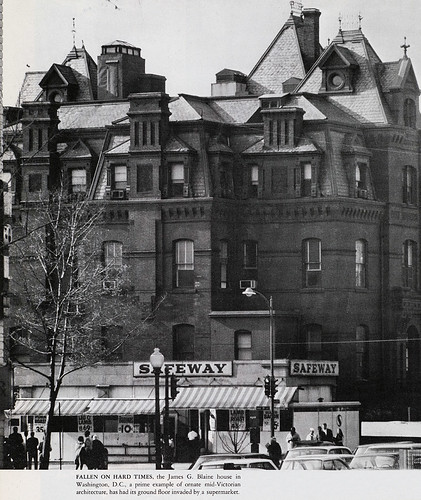 A DC Safeway store, circa 1965.
A DC Safeway store, circa 1965.This led the company to close many smaller stores in the city, in favor of replacing neighborhood-based stores you could walk to with larger "regional" stores serving multiple neighborhoods that required a car trip (e.g. closing stores on the eastern and western ends of H Street NE, and other locations, in favor of a much larger store at the then new Hechinger Mall).
Safeway and value destruction. More recently, their previous CEO bought a bunch of regional supermarket companies and then destroyed their unique qualities, while trying to make them "Safeways", costing the company many billions of dollars in value.
The new CEO sold off high-value divisions like Safeway Canada, and shut down the failed divisions in Chicago and Philadelphia.
Redeveloping store sites as mixed use, and opening stores in mixed use locations. Meanwhile they have been actively redeveloping sites in DC, as part of their "Life Style" store format push and investing in new stores, based on a pilot program launched in Portland more than 10 years ago.
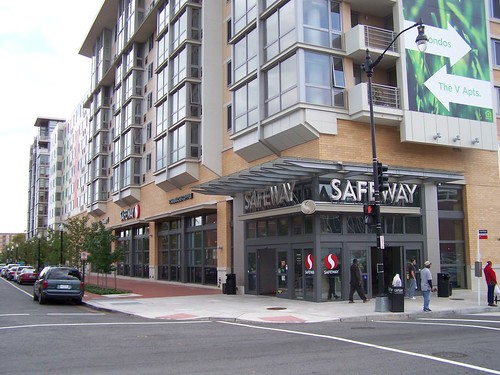 They've also committed to opening new locations in mixed use locations like the City Vista development at 5th and L Streets NW (pictured at right).
They've also committed to opening new locations in mixed use locations like the City Vista development at 5th and L Streets NW (pictured at right). In fact, a few months ago the new Safeway store + housing above opened in Petworth and it's awesome.
But I still think supermarkets in urban areas could be more urban, as I wrote in an op-ed in the Washington Business Journal a couple years ago, "Urban Safeway Design Misses Mark."
Grocery stores don't make that much money. Generally the profit margin on groceries is pretty low for a supermarket, under 5%. The typical store sells about $500,000 worth of product per week, although an urban store could sell double that.
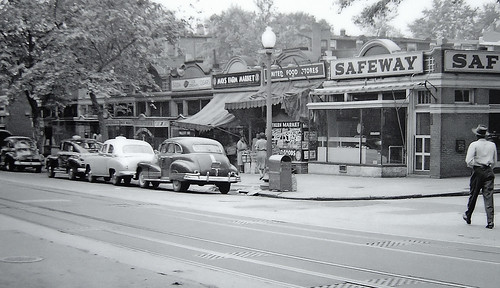
Circa 1951 photo of a Safeway at 11th and Kenyon Streets NW in Columbia Heights. This is an example of the kind of small neighborhood-sized stores that supermarket chains like Safeway used to have.
Acquisition by a private equity firm focused on realizing value present within underutilized real estate. More recently, Safeway has agreed to merge with Albertsons, owned by the Cerberus private equity firm. One of the reasons that Cerberus has moved into this sector is that many supermarket chains own real estate--store sites and shopping centers--and the value of the underlying real estate can be worth more than the profit stream from store operations.
Cerberus was involved with the first divestment of Albertsons by Supervalu, and closed many stores, selling the real estate, or selling stores to other operators. Last year they bought the rest of Albertsons and other chains (like Acme in Philadelphia and Stars-Shaws in Boston/New England) from Supervalu, with the plan to close stores, sell others, and make money off the real estate ("Cerberus’ $3.3B Deal for 877 Grocery Stores Could Mean More Store Closings: Future of SuperValu, Albertsons Now in the Hands of Real Estate Guys," Costar).
In 2014, they initiated merging with Safeway, in part to graft Safeway's management depth onto the supermarket side of the combined company, while extending the real estate maximization strategy from the Albertsons side of the company to Safeway.
The old Petworth Safeway site was one of many urban site redevelopment projects initiated by the Safeway management before Cerberus.
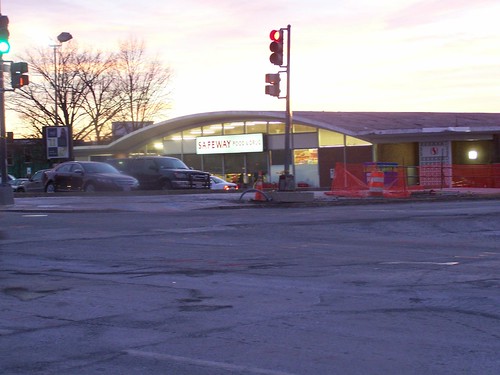
The new Petworth store is awesome, and about a 2 mile bike ride for me.
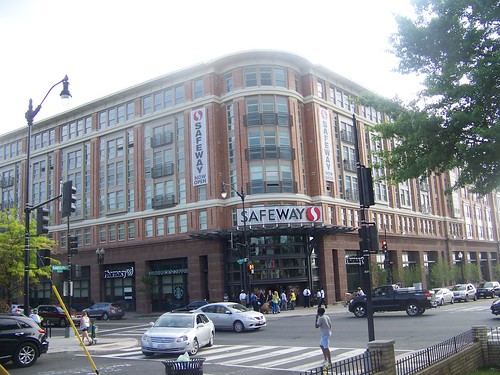
Safeway is now less patient when it comes to redeveloping stores and will even walk away. Already the change in regimes is evident. More recently, rather than continue with a project in Tenleytown that had dragged on for years, Safeway sold the property to a local private school ("Georgetown Day School buying Tenleytown properties," Post) and will close the store.
New developments in the Palisades suggest that Safeway will sell the property and close the store, and forbid the opening of another grocery store on the site. In the Palisades, according to ongoing coverage in The Current Newspapers, many residents have opposed a proposal to redevelop the Safeway site there, which like the Petworth project, but smaller, would provide a renewed grocery store on the ground floor, with housing above.
Opposition has slowed down the project considerably and pushed it into the period where the Cerberus firm is in charge.
Now, apparently it seems that Safeway is going to sell the site, close the grocery store, and impose a covenant on the property that will disallow a grocery store from opening there--these types of retail covenants are common and pernicious. A few years ago, Chicago banned such covenants, but DC never has (see the 2005 entry, "Chicago City Council proposes law making retail restrictive covenants illegal").
Safeway supermarket in the Palisades. Google Street View image.
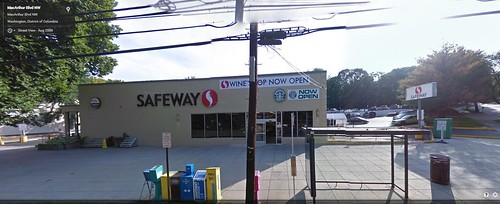
Sure it might just be a strategem, but Safeway has already demonstrated that they are now prepared to walk away. Besides the Tenleytown example, they shut down 72 stores, selling maybe half of them, in Chicago and did something similar in Philadelphia, and they are closing suburban locations in the Washington area too.
According to Supermarket News, separately, Safeway has put its real estate development arm up for sale.
Undesirable outcomes as a distinct possibility: the Square 2986 story and Walmart as the "final" outcome. What's unfortunate and ironic about this situation is that residents often fight projects, not recognizing that there can be worse outcomes beyond their imagination--that the endgame isn't "no development" but "some kind of development you don't have any input into."
For example the large tract of land at Georgia and Missouri Avenues that had been a car dealership, after a long period of opposition, was approved to be redeveloped as ground floor retail with more than 400 units of housing above. Such a project would have been a significant revitalization boost to Upper Georgia Avenue, which languishes due to lack of density and no Metrorail stops between Petworth and Silver Spring.
But by the time approvals came around, financing was unavailable because the real estate market slid into recession. This property, lacking Metrorail access, was considered far less desirable in a period where financing was extremely difficult to obtain.
Eventually the real estate developer, only minimally committed to DC anyway, decided to take a quick profit and signed a 75-year lease with Walmart for a single use project.
The residents and the city are now stuck with that project for three generations because the residents didn't consider that possible outcomes could be much worse, especially if economic conditions changed. Worse outcomes weren't conceivable to them.
No grocery store is the worst possible outcome for the Palisades. It looks like something similar will happen in the Palisades, because now being owned by a company concerned more about realizing profits and earning a high rate of return, not so much about selling groceries, Safeway no longer will pursue a project for many years before it comes to fruition.
Similarly to the residents living near Georgia and Missouri Avenues NW, opponents to the proposed changes couldn't have imagined that one real alternative would be no grocery store at all, forcing everyone to drive a few miles away to the next nearest store.
Labels: civic engagement, neighborhood planning, real estate development, supermarkets-groceries, zoning



21 Comments:
Single story, single use retail -- especially when it has adjacent surface parking -- is the absolute worst use of urban land, even in the Palisades. (Based on what I know of Palisades NIMBYs, losing a grocery store couldn't happen to a nicer bunch of people.)
I imagine if Safeway ever wanted to do something about the eyesore three blocks from my house on the Hill, my NIMBY neighbors would go absolutely nuts opposing a mixed-use project, never mind the huge benefits to the neighborhood (critical mass of residents for much-desired retail, more eyes on the street, etc.) and that the site sits one block from a Metro station.
And I will brook no arguments that that Safeway is not an eyesore. From an urban design standpoint, it plain and simply sucks!
The blank walls facing D and E Streets, the ocean of surface parking (talk about urban heat island and storm water runoff!), the suburban style sign, the poorly maintained shopping cart corrals, allowing the trees separating the ugly parking lot from the sidewalk to die and not replacing them, etc.
If CHRS made a a stink about replacing it with a mixed-use project, which they would (loss of parking! new neighbors! bike terrorists! people who make less money than we do!), I would love to challenge them to be real historic preservationists and ask them to support rebuilding a brewery and beer garden on the site.
CHRS is full of shit and they are extremely regressive and should be replaced with amore updated and REAL historic preservation organization that does not care about parking and property values as much. They have done much to destroy or hold up positive developments on CH and the area. What would be excellent would be for the old brewery tower to be rebuilt - and a real German bier garten to go back in there as it was before. No dobut the Safeway at Kentucky avenue will be prevented from any improvements because of its "historic parking lot" and no doubt that NIMBYs will wreck anything good if it is actually proposed for that dismal site. On another note- I still recall the wonderful jewish deli that was on Georgia Avenue across from the original Hechingers- those guys were great- and they closed up shop sometime in the 80's or 90's. I recall during junior high school days going there- Petworth had a large Jewish population right up into the mid- 70's when they left [ crime was rampant of course]. Much of old DC goes unremarked upon like this - and the old mom & pop stores in this city were amazing. Now we have chain stores only- and NIMBYs fighting off anything resembling the old ways.
I wished this happened more often.
well, the Petworth store conversion was led by a property dev. firm started by the guy who had worked for Lowes on the CityVista development.
So it takes a motivated developer too, probably, to get Safeway to move.
But I've always figured that the Kentucky Ave. Safeway was a great opportunity for redevelopment. It's close to the Potomac Ave. Metro... (I lived near there for about one year in 1992 I think).
But yes, I do think a developer would shy away, based on the expected opposition.
The thing I didn't mention is the Giant project in Cathedral Heights. No normal developer would spend 10 years dealing with such a project... Basically, with the Tenleytown property sale, Safeway announced indirectly that there was a new approach-regime.
well, I hate to impugn CHRS but the pres. groups do seem to be overly narrowly focused.
In my neighborhood there is the EYA project at the Metro and Historic Takoma is highly oppositional.
Speaking of your "historic parking lot" (and there are a couple that I would defend, such as at the Park and Shop on Connecticut Ave. in Cleveland Park, as being distinctive elements of the building type), people were testifying about the proposed building being a blight on the neighborhood.
I countered, "It's a parking lot now. You're really defending keeping a crappy looking parking lot over housing?"
2. If they'd focus more on what the building would look like (I blogged about it), it'd be possible to get something nicer.
I never went to that deli, which was open into the early 1990s I believe... wrt Petworth and Jewish population, "outmigration" was an in-city phenomenon before it was a suburban phenomenon.
The patterns of Jewish outmigration in Detroit, Baltimore, and DC are very similar. First north in the city, then north out of the city, and then even more northwest.
(Suzanne, more motivated to look at my genealogy than me, found some interesting things lately with regard to my father's parents, and where the family lived in Detroit in the 1940s.)
interesting how the Jewish Germans and Christian Germans in DC outmigrated to the same places- even within DC. identical cultures and things like food and restaurants were so similar as to be indistinguisable to someone in pre- WW1 DC or any other large city. My dad told me that my grand father often got food at that deli which had been there since the 1920's. He said that if someone was German it was always welcome to grandpa even if they were not Catholics !!
MEMORANDUM
To: Chairman Phil Mendelson
Council Secretary Nyasha Smith
From: Councilmember David A. Catania - Councilmember Mary Cheh
Date: October 2, 2014
Subject: Notice of Intent to Move/Request that Emergency Legislation be Placed on the Agenda of the October 7th Legislative Meeting
Councilmember Mary Cheh and I would like to request that the following measures be agendized for the Legislative Meeting on October 7, 2014:
- "Grocery Store and Food Retail Restrictive Covenant Prohibition Emergency Act of 2014".
- "Grocery Store and Food Retail Restrictive Covenant Prohibition Emergency Declaration Resolution of 2014."
- "Grocery Store and Food Retail Restrictive Covenant Prohibition Temporary Act of 2014".
Upon selling off excess or closing stores and their accompanying land, grocers often enter into restrictive covenants or usage restrictions which prohibit subsequent owners and/or developers of the property from opening new grocery stores. These usage restrictions can be for a finite or indefinite period of time. This undermines competition in the grocery store industry and creates "food deserts," which limit resident access to fresh food.
It has been recently reported that the Safeway grocery store and property located in the 4800 block of MacArthur Blvd. NW is up for sale and the company has in prior sales required the purchaser and/or developer to agree to a restrictive covenant. Such a provision would prohibit reuse of the property for a similar or analogous use, i.e. a grocery store or retail food establishment of any kind. In an area bereft of other grocery store options this unnecessarily harms resident access to healthy, affordable food.
Such covenants are particularly detrimental as residents of city neighborhoods rely on the close proximity of grocers to their homes as nearly 4 in 10 District households are car-free. Further, the District's seniors and those residents who intend to age in place rely on immediate access, as they often face mobility challenges.
The District has long sought to expand the number of grocery stores in neighborhoods throughout the city as the benefits of a full service, neighborhood grocer are well established. The circumstances described above underscore the need for the Council to act in order to prohibit such restrictive covenants and prevent the creation of food deserts in the District.
Should you have any questions, please contact my office at 724-7772.
cc: Members, Council of the District of Columbia
Office of the General Counsel
Office of the Budget Director
Also, apparently Scott Nash of MOM's organic announced Friday that MOM's made a serious offer to buy the Palisades Safeway building.
Wow. Thanks for that update. Although the justification statement is a little inaccurate.
FWIW, I wrote about this issue in 2005. It was in 2003 or 2004 when I learned about the impact of such covenants in DC, on H Street particularly. I guess better late than never.
Ironically, because of the change in control it won't matter but for many years a retail covenant was in force for the building that Safeway used at 6th and H Streets NE. When they opened the store at Hechinger Mall, they placed a retail covenant on that space (the same probably for the space in what is now studios for Atlas Performing Arts Center). A CVS opened up eventually. And later a Murry's, so the covenant must have expired by then. But now the buildings are being demolished in favor of a new complex which will include a Whole Foods.
2. Plus, you may recall that this is an issue with movie theaters too, although it matters less now.
The Foundry Theaters in Georgetown, when closed, had a covenant preventing them from being leased to another theater.
1. Presumably any covenant restricting the use of the property in perpetuity, will lower its value. Safeway will make less money on the sale, and they surely know this.
2. Your placing fault for the loss of the store on "neighborhood opposition" is unfair because it is untempered. You do not consider the plans that the neighbors were opposing: Safeway may have proposed the most hideous or unsuitable development, and there could be very good reason to oppose the development.
1. They figure it's a small cost over all. They still make about as much money, and they ensure residents have to change their behavior and go to the extant stores outside of the neighborhood.
where this was obvious was H St. The Hechinger Mall store resulted in the loss of many smaller stores, including stores at either end of H St. I know there was a covenant on the 600 block space, for many years anyway. It meant that people had to drive to the "new store."
(The same happened in Brookland, with stores at either end of 12th St., and the new bigger store on Rhode Island Ave.)
2. Sure, but what was proposed wasn't out of the ordinary. It's not as if they proposed something more comparable to what was done in Wheaton (something like 26 stories). What was proposed was in concert with the zoning on MacArthur Boulevard.
The thing is e.g., with the thread in the piece on GGW, and the person (Angst) writing about how such a project would significantly change the neighborhood, people "tend" to exaggerate, equating any change with "Bethesda" or "MCI Center" or skyscrapers, or any liquor license is equal to Bourbon St. in New Orleans when in fact, they are wrong. The situations aren't equivalent, and the change isn't all that significant.
That can be true with massive projects too, like Barclays Center, according to coverage in the New York Times.
That being said, some projects can be significantly different.
But what was proposed originally by Safeway, either in Palisades or in Tenleytown, was not.
Not to mention that in the 21st century, development, financing, and property tax conditions are different than they were when the neighborhoods were first constructed. To remain relevant and resilient now, these neighborhoods need to change a bit, in those places--usually commercial districts--where change can be accommodated the easiest, with minimal negative impact on the vast majority of the neighborhood.
Safeway's original proposal included 100 $M condos on the roof of the new store, making it a total of 7 stories, in a neighborhood where only a few garden apartments are taller than 2 stories. It may have been within the zoning regs in so much as they were residential units, but the construction could not have been done without a zoning variance for the MUD, approved by the BZA (who have already proven to be captives of the developer community)
" The Hechinger Mall store resulted in the loss of many smaller stores..."
Not sure what your point is here. That mall is still there (although greatly diminished), but the area has certainly rebounded of late. It is anchored by Aldi's and CVS, and the old mall still has smaller stores.
safeway survey
Vintage Inns Survey: Step by Step Guide to take Vintage Inns customer satisfaction survey.
Enjoy free coupons which can allow you to buy free things on next visit. Ready to win rewards?
The latest & Updated Step by Step Guide for Vintage Inns survey online
Vintage Inns Survey
Vintage Inns customer satisfaction survey
Vintage Inns survey online
Good Chance to win instant reward by completing Dollar General survey.
If you Want to Win reward by Dollar General Survey feedback? Or Do you want to complete
Dollar General Customer satisfaction survey or Dollar General Guest Feedback? Here in this post I have given
step by step guide for complete Dollar General customer satisfaction survey and Dollar General guest feedback
Dollar General Customer Satisfaction Survey
Dollar General Customer
Dollar General Survey
Dollar General Feedback
Very Informative topic I liked it very much. You have covered the topic in detail thumbs up.
Best law Firm
https://sacrificialmaterials.blogspot.com/2013/04/a-citizens-citizen-for-that.html?showComment=1564850766841#c6042041589128384856
Great post really useful information. We are the leading seo company in kuwait. Hire our seo agency in kuwait today for best seo services in kuwait.
Post a Comment
<< Home